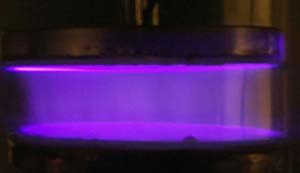
In the fall of 1952, Stanley Miller, now a chemistry professor emeritus at the University of California, San Diego (UCSD), began simulating primitive earthly conditions in an experiment that produced the basic building blocks of life. When he published the results in Science on May 15 the following year, he kick-started research on the origin of life and transformed modern thinking on a dormant area of science.
Jeffrey Bada, a professor of marine chemistry at Scripps Institution of Oceanogr

Solving a longstanding scientific puzzle, researchers at the University of Illinois at Chicago have not only discovered how the body’s first line of defense against dangerous microbes inadvertently helps HIV rapidly infect the human immune system.
They’ve filmed the process as well.
In a remarkable series of movies created with images from time-lapse microscopy, UIC microbiologists Thomas Hope and David McDonald have documented how HIV enters human T cells, where it multip

Researchers at the University of Pennsylvania have created the first mammalian gametes grown in vitro directly from embryonic stem cells. The work, in which mouse stem cells placed in Petri dishes — without any special growth or transcription factors — grew into oocytes and then into embryos, will be reported this week on the web site of the journal Science.
The results demonstrate that even outside the body embryonic stem cells remain totipotent, or capable of generating any of the body&

Scientists at Bristol University have found evidence for a new protein in the heart that could one day aid development of new drugs to regulate the heart.
The ability of the heart to function as a pump that drives blood around the body depends on the electrical behaviour of muscle cells from various regions of the heart. Different cardiac regions have distinct electrical events, specialised for their particular roles in the heart.
While studying the electrical activity of he

Thermography provides the easy checking of points throughout an electric system where faults may arise, and with sufficient warning in order to correct the fault before things get worse.
Infrared thermography provides the visualisation of temperature differences arising at the surfaces of objects. The tool used is a portable and autonomous camera (similar to a home video camera) which is equipped with a detector which permits the measurement and visualisation of thermal images.
Th

The use of toxic chemicals to sterilise medical instruments may soon be a thing of the past, according to researchers at Old Dominion University in Norfolk, Virginia, and the University of California in San Diego. Their work, released on 30 April 2003 in New Journal of Physics, published jointly by the Institute of Physics and the German Physical Society, tests a new way of killing bacteria using a plasma at room temperature and pressure, which could have applications in decontamination of biological

– new calculation confirms standard model of particle physics. Contribution of hadronic vacuum polarization determined with unprecedented accuracy. The magnetic moment of the muon is an important precision parameter for…
Technique may prevent formation of unwanted waves that siphon off needed energy. Heating plasma to the ultra-high temperatures needed for fusion reactions requires more than turning the dial on a…

An international team of astronomers, led by researchers from the Astronomical Observatory of the University of Warsaw, have identified a new class of cosmic X-ray sources. The findings have been…

Antibody that Neutralizes Inhibitory Factors Involved in Nerve Regeneration Leads to Enhanced Motor Function after Acute Spinal Cord Injury. Researchers at 13 clinics in Germany, Switzerland, the Czech Republic and…

How the body’s natural killer cells could fight leukemia. Every year, some 13,000 people in Germany are diagnosed with leukemia. Despite intensive chemotherapy, around one in two of them die….

… eco-friendly reactor converts air and water into ammonia. Producing enough ammonia to feed the world comes with a large carbon footprint;. process described in new UB-led study could help…

How simulations help manufacturing of modern displays. Modern materials must be recyclable and sustainable. Consumer electronics is no exception, with organic light-emitting diodes (OLEDs) taking over modern televisions and portable…

“Neurons that fire together, wire together” describes the neural plasticity seen in human brains, but neurons grown in a dish don’t seem to follow these rules. Neurons that are cultured…

The quest for sustainable energy solutions has been a major focus of scientific research for decades. Solar energy, a clean and renewable source, has emerged as a promising alternative to…

With a processing speed a billion times faster than nature, chip-based laser neuron could help advance AI tasks such as pattern recognition and sequence prediction. Researchers have developed a laser-based…

New technology could remotely identify various types of plastics, offering a valuable tool for future monitoring and analysis of oceanic plastic pollution. Researchers have developed a new hyperspectral Raman imaging…

Artificial Intelligence (AI) has established a strong presence across industries, large and small. The “VoBaKI” research project has empowered small and medium-sized enterprises (SMEs) with an innovative tool to independently…